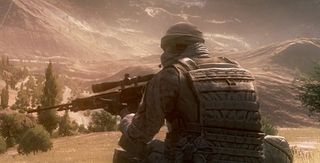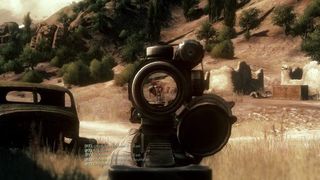Operation Flashpoint: Red River preview

I'm bleeding out.
I'm bleeding out because I'm an idiot. Operation Flashpoint: Red River can be played alone, but that's not how you're supposed to fight a war. The campaign and multiplayer modes are crafted around four players working together as a Fire Team, endeavouring to complete an objective and win a war. This means I'm not the only one to blame for my current situation, but being the Fire Team leader means I've got to shoulder the lion's share.
Me and my plucky sidekicks aren't playing the campaign. We're trying our hand at the standalone co-op missions; a mix of offensive and defensive, rescue and escort game modes that run as a compliment to the main story. The one I'm bleeding out in? That's Last Stand, and our performance wasn't anywhere near as heroic as that moniker might lead you to believe.

Last Stand sees you defending a position against increasingly deadly waves of Chinese PLA forces, who start out as little more than scouting parties before becoming a full on invasion force. What lets it take a step back from the crowd of clamouring horde modes and defense missions in other games is that this isn't really a last stand. That's just a dramatic name they've given it. Here, dying isn't the final outcome, because your score dies with you. Instead of just getting as many points as you can before dying, you need to play the risk/reward game and figure out whether you want to cash your points in at the evac chopper between waves, or go for another. It's like the Weakest Link, but with more gunfire and less sniping.
The other difference between this and other Last Stand modes is that being alive isn't enough to win, because your location is as important, if not more, than you are. The level is divided into sectors, each providing you with a score multiplier for holding it. Lose control of a sector near where the enemies drop in, and your score goes down. Keep it and you'll be in much more imminent danger, but at least your score will be headed towards the stratosphere.

This is where my mistakes started. The level we were playing was laid out with a walled slope at one end, and an open section of flat land in front of it leading to where the Chinese helicopters would drop off their troops. Preferring to keep maximum distance between me and people who want me dead, I set the Fire Team along the walls; one on an MG, the rest with clear lines of sight to the oncoming forces. Me? I was a Scout, awarding me a semi-automatic rifle with a scope. That meant I could be furthest away. Which suited me just fine.
The first few waves are dispatched without a hitch. Sniping in Red River is surprisingly satisfying, as the enemy AI works on a line of sight basis. If they can't see you, and you aren't shooting at them, they don't know where you are. You fire, they hear you and send bullets your way. But should you duck behind cover and relocate, they'll continue to fire at your last known location. It works both ways, too, with enemy locations flashing up on your compass as they're seen, moving from hard, certain red triangles when you've got direct line of sight, to blurry, vague blobs once their position is unconfirmed.
The biggest gaming news, reviews and hardware deals
Keep up to date with the most important stories and the best deals, as picked by the PC Gamer team.

The way the AI works is a symptom of the open design of Red River. “It's not scripted, like whack-a-mole AI. It's much more autonomous; I'd describe them as more like improv actors.” That's Sion Lenton, the game's Creative Director at Codemasters. “They know what the scene is, and they know they need to get from A to B, but when we say 'Action!' they react to whatever's going on. Because it's an open world, when you come down the middle, they might flank you or pick you off from a distance, but if you take another route, they've got to be able to react to that appropriately. If you play the game differently, the AI will react differently.”
But this isn't ArmA, and it's not trying to be. The last game in the series, Dragon Rising, struggled to find a balance between its roots as a military simulator and its desire to appeal to Call of Duty fans. Red River is still far from its heavily-scripted competition, but it has a clearer idea of its own image. “We want to steer away from the idea that it's a simulation; we've banned the word in the studio. Authentic is fine, as it gives you some leeway to be creative, and that's what we are. We're creative, we're making an entertainment product, and it should be fun. I don't really get much fun out of military simulations. They're immersive, they're realistic, but I wouldn't call them fun.”

Which leads me back to my current predicament, slumped against a wall at the top of our slope, our high score in stasis as we get overwhelmed. But this isn't the end, not by half. I might be bleeding out, but I can patch myself up. Bullets might kick you in the face like a particularly flexible donkey, but you can recover. It's a matter of maybe ten seconds of hiding in cover and applying bandages before I'm as good as new. First you stop the bleeding, then you get rid of the injury.
My dead Fire Team respawn behind me, (at a considerable cost to our score), and we push back the PLA before re-establishing our position. I glance left, where our evac waits, rotors whomping. Then I glance down our killing field. This is where I make a choice: whether I can push on further for a higher score, or give up the ghost and admit that another go at this is probably going to finish us off. We were flanked, out-maneuvered, out-gunned and out-thought. In a very real way, the AI was smarter and better than us during that last wave. Tackling the next wave immediately probably isn't a good idea.

But I run out of time. The chopper takes off, leaving us to fight another swarm of angry men with angry guns. At least we've got the multiplier on our side, and now I know that the enemy has a brain.
Dragon Rising failed because it was a confused mess, full of uninspired level design and no clear vision of whether it was a simulation or a shooter. Red River seems like a much clearer game: avoid being slave to the realism of battle, and focus on getting the feel of it right.
Most Popular


